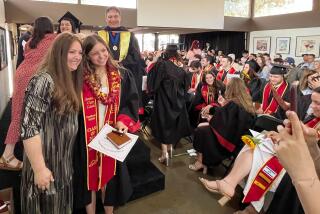Belgrade’s Class of ’99 Finds Little to Celebrate
- Share via
BELGRADE, Yugoslavia — Rock ‘n’ roll blared from the ballroom of a luxury hotel in the Yugoslav capital Saturday night as the Class of ’99 gathered in cocktail mini-dresses and suits for a traditional high school graduation ball.
But this was no ordinary graduating class after what has hardly been a typical school year.
On Yugoslavia’s first official day of peace after nearly three months under a formal state of war, the teenagers who partied until 4 a.m. today were from Belgrade’s elite School of Mathematics, which lost one of its own in NATO’s air war.
Missing from the festivities was Sanja Milenkovic, one of the school’s brightest students, who was killed May 30 in a wrenching scene of civilian “collateral damage” when a NATO missile hit a rural bridge.
Yet the graduation party showed how Yugoslavia’s next generation is--and isn’t--coping with the scars of war and a future after defeat in a battle-scarred city that is fast restoring the cultural icons of its enemy.
“We’re all just trying to forget all that,” said Isidora Milin, 17, one of the school’s top graduates, who’s headed to Harvard University, as the ball began. “We’re trying to live a normal life again. But, of course, that’s not really possible.”
As last week’s parliamentary vote lifting the official state of war took effect, there were signs the city was itself trying to get back to normal. McDonald’s billboards already have returned to Belgrade’s streets. And one of the American burger restaurants, which was trashed by angry Serbs at the start of the war, was packed at lunchtime.
The New York, New York Restaurant, which changed its name to the Baghdad Cafe after the NATO bombardment began, has opted again for its original title. “Life goes on,” shrugged a 27-year-old cafe waiter who gave his name only as Zelko. “Yesterday, I had my first Big Mac in three months.”
And after a defeat the Yugoslav government has cast as a victory of survival, a ticket agent at Belgrade’s central bus station, who declined to give her name, concluded: “Everybody’s lying here--except Bill Clinton. I only trust Clinton. He said he was going to bomb us, and he bombed us. At least he keeps his word.”
Outside her ticket booth, there were few signs of an expected postwar exodus of draft-age men. The state of war had barred all Yugoslav men ages 16 to 60 from leaving the country.
Explained another ticket agent, who identified herself only as Vera: “It’s hard to get visas because the NATO embassies are still closed. Besides, no one can afford it.”
So it was in a capital city filled with the ruins of fuel depots, factories and federal structures--an urban landscape the ticket agent called “our Twilight Zone”--that the scene and the voices in the Hyatt Regency’s Crystal Ballroom late Saturday spoke volumes about the war’s effect on the next generation of Yugoslavs.
All of the students who rocked into the night had experienced the NATO attack that killed Sanja like it was an assault on a close relative.
The blast on the bridge that toppled cars into the Velika Morava River and killed at least nine civilians, including a priest, came at 12:53 p.m. in the southern Serbian city of Varvarin. It dealt a serious blow to NATO’s credibility at a time when Yugoslav President Slobodan Milosevic was talking peace.
Even amid the graduation celebration, the newest alumni of the School of Mathematics, which admits only the brightest minds of this nation, felt the pain of the past--and the future.
“It was as if we had lost a member of our family,” said Nikola Petrovic, who is going to MIT in the fall.
Added Isidora Milin: “Nobody could actually understand who was to blame. Her parents were trying to find a culprit. But I think there are too many of them.”
And what now?
“I’m afraid to look at the future of Yugoslavia,” Milin said. “It is uncertainty. It’s hard to find not only a job or a career but even a place in society. For me, I have hope. I’m leaving.”
Rade Stanojevic, 18, is not.
“I’m not looking forward to a new tomorrow. The whole situation in the country is so horrible,” he said, as dance music kicked in behind him.
“I think about it, and I cannot believe that anything good can happen in the next few years. And then I think, ‘I’m the future generation of this country.’ ”
More to Read
Sign up for Essential California
The most important California stories and recommendations in your inbox every morning.
You may occasionally receive promotional content from the Los Angeles Times.










